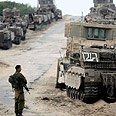
As of now it is about flexing muscles: The IDF still does not have the green light to launch the war machine. Meanwhile, cameras are following the troops as they move toward Gaza, Israel is sending Hamas bloody signals in the form of targeted killings, and the Palestinian Authority is being pressured to act as well.
Basically, Israel is holding itself back at the moment, but this can change in an instant. One deadly Qassam attack and the forces would pour into Palestinian-controlled areas in the Gaza Strip.
Neither Hamas, nor Israel or the PA are interested in an all-out war; therefore, the possibility that the current crisis would end without irreversible escalation is increasing with each passing moment.
The targeted killings of senior Hamas terrorists in Gaza City and in the West Bank town of Salfit took place less than an hour apart. The time that had passed since the decision to return to the targeted killing option and the detection of possible targets was incredibly short, and once these operations were completed, the fighting between the PA security forces and Hamas stopped.
Forget about it
The apparent determination on the part of the PA to act with full force against Hamas terrorists dissipated. Furthermore, the PA told Israel it would not act against the terror group as long as Israel carries on with the targeted killing policy.
If these assassinations reunite the Palestinian factions, then the storming of tanks into Gaza would strengthen this Palestinian bond even more. This time the tanks would not stop in Khan Younis or Beit Hanoun, they would infiltrate Gaza’s refugee camps to create buffer zones, a move that would certainly result in dozens of Palestinian casualties.
In this type of situation, Israeli can forget about a coordinated pullout from Gaza; the PA would not cooperate. This is why Israel is not quick to give the IDF the go-ahead.
IDF officials disagree
During the weekend, the IDF concentrated opposite the Gaza Strip two infantry brigades that up until now had been engaged mainly in setting up roadblocks against Jewish infiltration into the Strip.
These forces are set to be a part of the Gaza Division, which is designated to thwart terror activity during the disengagement. The IDF has simply deployed its forces early.
The security establishment has not altered its basic assessment, whereby the disengagement would be carried out in cooperation with the PA despite sporadic terror attacks.
But senior IDF officials are in disagreement. There are those who claim the aforementioned assessment is outdated, as Hamas has broken the agreed-upon truce. Therefore, these senior officers say, it would be wise to launch a military blow at Israel’s convenience in a bid to begin the pullout after the fighting has subsided.
However, Defense Minister Shaul Mofaz and senior army officials contend Hamas’ leadership still has its eyes set on the political option and supports the implementation of the pullout.
Should Palestinian Authority Chairman Mahmoud Abbas comply with Hamas’ demands to participate in determining the terms of the disengagement and provide the organization with parts of the evacuated areas, Hamas would calm down.
Situation on brink of collpase
The Egyptians were also brought into the mix: A delegation of Egyptian security officials arrived in Gaza in an effort to rehabilitate the cease-fire. U.S. Secretary of State Condoleezza Rice is expected to make the trip this week to try and calm things down as well. Israel cannot launch a military blow without first exhausting the option of international pressure.
Israel must have the support of Israeli public opinion and of the international community before it applies force. Only in the event international pressure fails, would Israel have certain legitimacy to launch a military offensive.
Despite the drop in Qassam rocket launchings on Saturday in comparison to Friday’s onslaught, the situation remains delicate, on the brink of collapse.
Here is where the Yesha Council heads' sense of responsibility will be tested: Do they want to expose hundreds of thousands of people to this volatile situation with their protest march?















